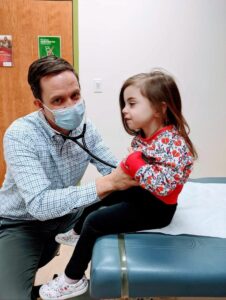When is Child Chest Pain Cardiac Related?
 While it’s not common, chest pain in children can be linked to cardiac-related issues, and it’s important to understand when you need to see a cardiologist due to this pain. Brandon Harden, M.D., a pediatric cardiologist at Children’s Healthcare of Atlanta Cardiology, shines a light on when your child’s chest pain could be cardiac related.
While it’s not common, chest pain in children can be linked to cardiac-related issues, and it’s important to understand when you need to see a cardiologist due to this pain. Brandon Harden, M.D., a pediatric cardiologist at Children’s Healthcare of Atlanta Cardiology, shines a light on when your child’s chest pain could be cardiac related.
How Common is Cardiac-Related Chest Pain
Chest pain is a very common complaint in children and adolescents. However, whether your child has a heart condition or not, chest pain is rarely cardiac related. “Although we see a lot of patients who come in with chest pain, it’s not associated with the heart 99% of the time,” says Dr. Harden. If a child’s chest pain is linked to a cardiac issue, the chest pain typically needs to be related to exercise or exertion. ”Unless your child is pushing their physical limits and starts feeling chest pain during strenuous physical activity, it’s not a concern that these cardiac-related issues caused the pain.”
A study was conducted at Children’s Healthcare of Atlanta that evaluated approximately 4,000 pediatric patients that presented to the emergency room with chest pain. In these patients, less than half of one percent had chest pain that was related to a cardiac cause.
Why Does My Child Feel Chest Pain
In most cases, chest pain in children is related to muscle or bone-related pain. “Muscle spasms, cramps, growing pains, injury to the chest, or even acid reflux can be the main causes of chest pain in children,” Dr. Harden says. Other common issues include lung problems like asthma or asthma-related issues.
If your child passes out, feels dizzy, or has a fast or irregular heartbeat as a result of chest pain, these could be symptoms related to a cardiac condition.
How Your Child’s Chest Pain is Evaluated
If you feel like your child’s chest pain is caused by a cardiac-related problem, you will need to bring them to a pediatric cardiologist. When your child is being evaluated, their vital signs will be recorded (such as blood pressure, temperature, heart rate), and they’ll be asked chest-related questions such as:
- Where is the pain?
- How long has it been occurring?
- How frequently is it occurring?
- Rate the pain on a scale of 1-10.
- Are you doing anything that brings on the pain each time (such as running, skipping, lifting weights, etc.)?
Based on their responses, this helps formulate how much more in-depth the cardiologist will need to examine the child to determine the cause of the chest pain. They may ask questions regarding their health history and perform cardiac tests including electrocardiogram, echocardiogram or exercise stress test. It should be noted, however, that cardiac testing other than electrocardiogram is rarely needed as part of the evaluation of chest in children. If your child is diagnosed with cardiac-related chest pain, the cardiologist will work with you and your child on what next steps they will need to take depending on the specific results they found.
“Even if your child’s chest pain is not coming from their heart, it is important to realize that the pain is real and not ‘made up.’ However, reassuring your child that the pain is not heart-related will often eliminate any anxiety surrounding the episodes. If you ever have new concerns about your child’s chest pain after an evaluation with a cardiologist, consult your pediatrician or primary health care provider,” says Dr. Harden.
Related:
Physicians with Heart: Dr. Brandon Harden
Children’s Healthcare of Atlanta: Chest Pain in Children
